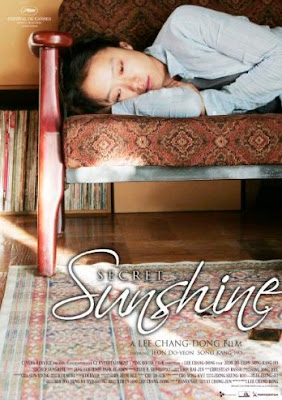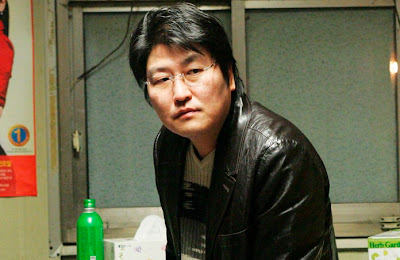A simple description plot-wise, of SECRET SUNSHINE, the Korean film adapted (from the novel by Yi Chong-jun) and directed by Chang-dong Lee (pictured below), could easily make this movie sound like soap-opera. Indeed, if you listed all the events that occur in this lengthy -- well over two hours -- tale (don't worry: I won't), you'd be hard pressed not to sum up: "Too much!" Yet the movie isn't.
Its odd success is due to Mr. Lee's ability to guide us through these many events with an eye that goes beyond the individual players themselves and into a sense of the entirety of life. We Americans, and probably movie-goers worldwide, are used to finding some closure from the films we love. That's why we keep coming back and back and back again. This filmmaker will have none of that. He doesn't slap us in the face with darkness and horror; he simply demonstrates how nothing works. When we want to find answers, they're just not there.
For instance, when the movie's big "event" occurs (all of it off-screen), we never learn any particulars -- why, when, where, how-- all staples of most films that feature this sort of situation. Our heroine, Shin-ae (played spot-on by Jeon Do-Yeon, above: She deservedly won Best Actress award at Cannes and elsewhere for her performance) -- who, with her elementary-school-age son, has come to the home town of her recently departed husband, to try to create a new life -- spends the remainder of the movie trying to come to terms with this event. Good luck.
The filmmaker resists the usual and typical explanations for beha-vior found in film of this type: he simply shows that behavior and lets us extrapolate from it. Mom certainly feels enormous pain and sorrow from what has happened, but she also must be experien-cing horrendous guilt. No mention is made of this by her or anyone else, but via what she says and does, motives become clearer.
When she turns to religion, becoming a born-again Christian (thanks to the town's busy-body pharmacists), she eventually gets the religion, along with its tenants of forgiveness and love, thrown back in her face in a bracing manner that I think is rather new to cinema. When a possible new love rears his head (very early on), this is greeted with a shrug. "Let me help you here: You're not her type at all," offers our heroine's brother to the suitor, played by the fine and versatile Song Kang-ho, shown above (from Thirst, Memories of Murder and The Good, The Bad, The Weird), who just keeps on trying.
By withholding what we (and his characters) may expect, Mr. Lee (who also gave us the unusual Oasis) forces us all to look at things differently, wrestling with the situation from another perspective. This is not initially thrilling -- or exciting, suspenseful, romantic or any of thse usual adjectives we might use to describe film we love. But it pays off. Perhaps not in quite so spectacular a fashion as to class this movie among the best films of the year (as two of The New York Times reviewers did this past week), but certainly enough to make it a must-see for film buffs who don't mind a movie that challenges and surprises.
Secret Sunshine, via IFC Films opens today in New York City at the IFC Center, while simultaneously available from IFC On-Demand (where it has appeared since early November.)












No comments:
Post a Comment